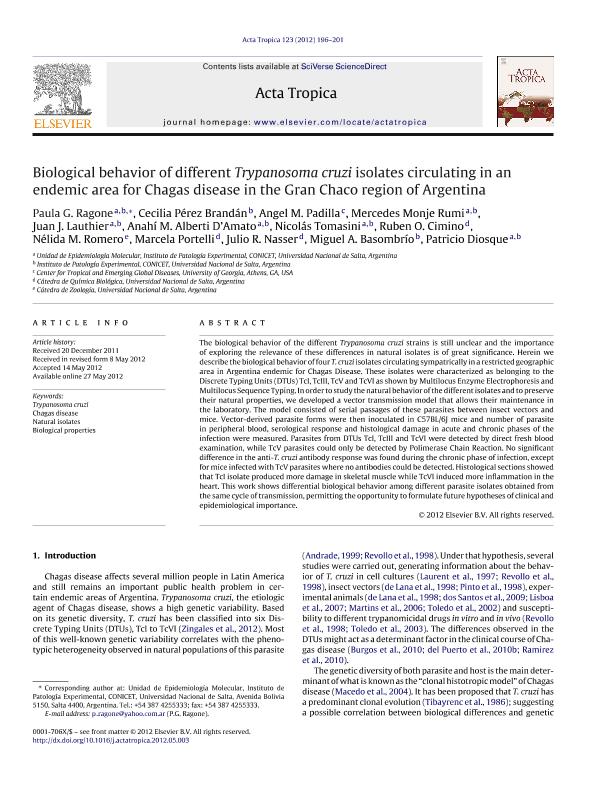Artículo
Biological behavior of different Trypanosoma cruzi isolates circulating in an endemic area for Chagas disease in the Gran Chaco region of Argentina
Ragone, Paula Gabriela ; Pérez Brandan, Cecilia María
; Pérez Brandan, Cecilia María ; Padilla, Angel M.; Monje Rumi, Maria Mercedes
; Padilla, Angel M.; Monje Rumi, Maria Mercedes ; Lauthier, Juan José
; Lauthier, Juan José ; Alberti D'amato, Anahí Maitén; Tomasini, Nicolás
; Alberti D'amato, Anahí Maitén; Tomasini, Nicolás ; Cimino, Rubén Oscar
; Cimino, Rubén Oscar ; Romero, Nélida M.; Portelli, Marcela; Nasser, Julio Rubén; Basombrío, Miguel Ángel Manuel
; Romero, Nélida M.; Portelli, Marcela; Nasser, Julio Rubén; Basombrío, Miguel Ángel Manuel ; Diosque, Patricio
; Diosque, Patricio
 ; Pérez Brandan, Cecilia María
; Pérez Brandan, Cecilia María ; Padilla, Angel M.; Monje Rumi, Maria Mercedes
; Padilla, Angel M.; Monje Rumi, Maria Mercedes ; Lauthier, Juan José
; Lauthier, Juan José ; Alberti D'amato, Anahí Maitén; Tomasini, Nicolás
; Alberti D'amato, Anahí Maitén; Tomasini, Nicolás ; Cimino, Rubén Oscar
; Cimino, Rubén Oscar ; Romero, Nélida M.; Portelli, Marcela; Nasser, Julio Rubén; Basombrío, Miguel Ángel Manuel
; Romero, Nélida M.; Portelli, Marcela; Nasser, Julio Rubén; Basombrío, Miguel Ángel Manuel ; Diosque, Patricio
; Diosque, Patricio
Fecha de publicación:
09/2012
Editorial:
Elsevier Science
Revista:
Acta Tropica
ISSN:
0001-706X
Idioma:
Inglés
Tipo de recurso:
Artículo publicado
Clasificación temática:
Resumen
The biological behavior of the different . Trypanosoma cruzi strains is still unclear and the importance of exploring the relevance of these differences in natural isolates is of great significance. Herein we describe the biological behavior of four . T. cruzi isolates circulating sympatrically in a restricted geographic area in Argentina endemic for Chagas Disease. These isolates were characterized as belonging to the Discrete Typing Units (DTUs) TcI, TcIII, TcV and TcVI as shown by Multilocus Enzyme Electrophoresis and Multilocus Sequence Typing. In order to study the natural behavior of the different isolates and to preserve their natural properties, we developed a vector transmission model that allows their maintenance in the laboratory. The model consisted of serial passages of these parasites between insect vectors and mice. Vector-derived parasite forms were then inoculated in C57BL/6J mice and number of parasite in peripheral blood, serological response and histological damage in acute and chronic phases of the infection were measured. Parasites from DTUs TcI, TcIII and TcVI were detected by direct fresh blood examination, while TcV parasites could only be detected by Polimerase Chain Reaction. No significant difference in the anti-. T. cruzi antibody response was found during the chronic phase of infection, except for mice infected with TcV parasites where no antibodies could be detected. Histological sections showed that TcI isolate produced more damage in skeletal muscle while TcVI induced more inflammation in the heart. This work shows differential biological behavior among different parasite isolates obtained from the same cycle of transmission, permitting the opportunity to formulate future hypotheses of clinical and epidemiological importance.
Palabras clave:
Biological Properties
,
Chagas Disease
,
Natural Isolates
,
Trypanosoma Cruzi
Archivos asociados
Licencia
Identificadores
Colecciones
Articulos(IPE)
Articulos de INST.DE PATOLOGIA EXPERIMENTAL
Articulos de INST.DE PATOLOGIA EXPERIMENTAL
Citación
Ragone, Paula Gabriela; Pérez Brandan, Cecilia María; Padilla, Angel M.; Monje Rumi, Maria Mercedes; Lauthier, Juan José; et al.; Biological behavior of different Trypanosoma cruzi isolates circulating in an endemic area for Chagas disease in the Gran Chaco region of Argentina; Elsevier Science; Acta Tropica; 123; 3; 9-2012; 196-201
Compartir
Altmétricas



